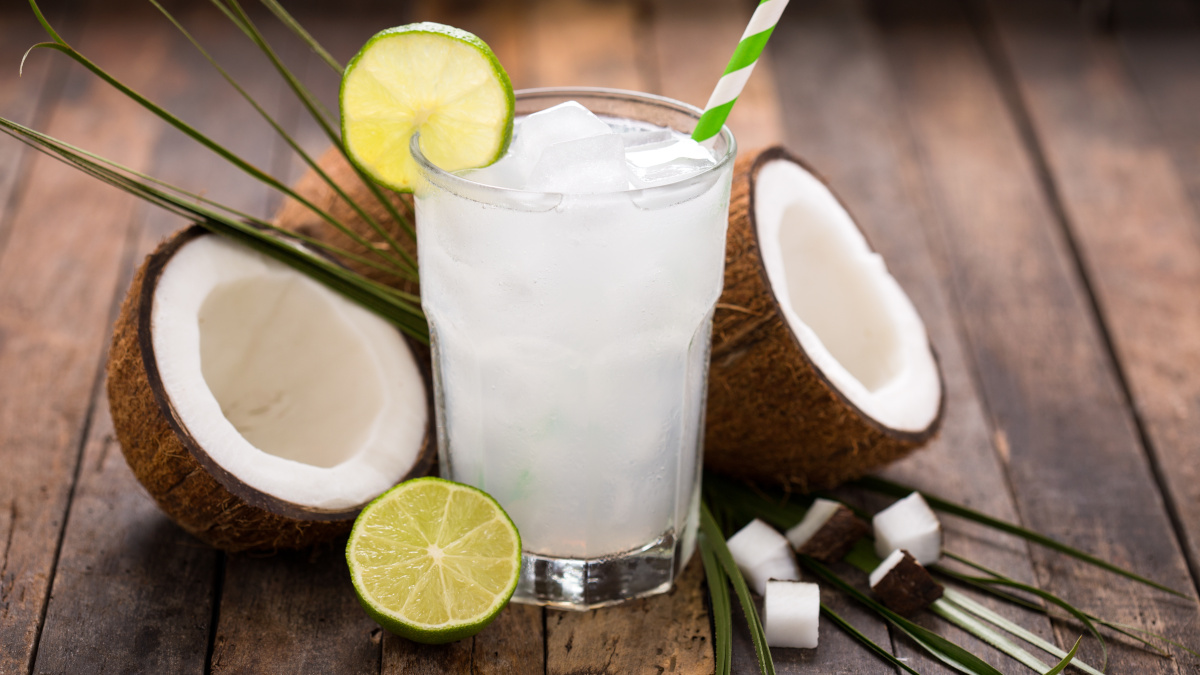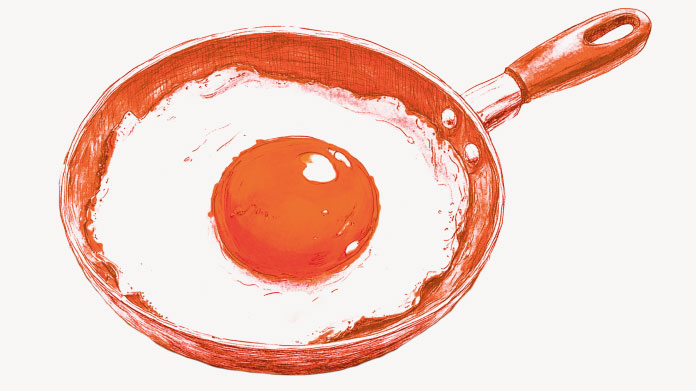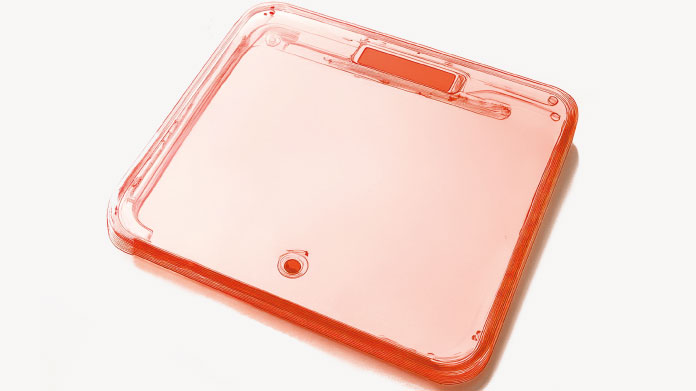
Brief description of the coconut
A brown shell and pearly white pulp: this is the form in which the coconut graces our supermarket shelves. But it bears little resemblance to the coconut fruit (Cocos nucifera) you’d find growing on a palm tree.
Weighing up to 1.5kg, this impressive, near-spherical drupe bears a smooth, green skin (exocarp) before it ripens. This conceals a fibrous husk (mesocarp), usually referred to as ‘coir’, which protects the inner, woody shell (endocarp).
This three-layered casing thus safeguards the heart of the coconut, the hollow kernel, which holds the famous coconut water. Its pristine walls constitute the pulp, from which we get coconut milk and coconut oil.
Originating from the biogeographical region of Malesia, this exotic fruit now grows in most tropical countries. Indeed, Indonesia, India and the Philippines are responsible for 70% of current global production.
Coconut water, the on-trend drink for maintaining good hydration
Often confused with coconut milk, coconut water (or coconut juice) is the liquid found in the kernel. Highly refreshing and thirst-quenching, it is marked by a near-absence of fats in favour of carbohydrates (3.33g/100ml), the body’s main fuel, responsible for its characteristic sweet taste.
In addition, coconut water has a high level of bioactive enzymes and minerals. It is particularly rich in, amongst others,potassium (200mg/100ml), a mineral which supports normal nervous system and muscle function (1).
It also contains a small amount of sodium (20mg/100ml), and is therefore a popular alternative to isotonic drinks for post-exercise recovery, for helping to compensate for the water and minerals lost through sweating (2).
Despite these many benefits, however, coconut water should never be used as a replacement for normal table water: drinking too much of it (say, several litres a day) can lead to excess potassium in the blood (hyperkalaemia), with adverse effects on kidney and heart function (3).
Coconut milk, for a touch of the exotic
The star ingredient in golden lattes and vegetarian curries, coconut milk brings a welcome exotic element to our menus.
But how does it fare nutritionally? Despite its description as a ‘milk’, the coconut variety differs significantly from animal milks. Much more calorific, at 188 kcal/100g, it also contains less calcium (just 18mg/100g) and a higher fat content – close to 18g per 100g – 90% of which is saturated fat.
So should you avoid it? Not necessarily, as coconut milk offers benefits too: an appreciable level of potassium (220mg/100g), magnesium (46mg/100g) and iron (3.3mg/100g), a small amount of selenium (3mcg/100g), protective phenolic compounds, and no lactose or cholesterol (4).
In fact the only caveat is that you should avoid drinking it like standard milk (pouring yourself a large helping every morning). But it’s fine to mix it with another, lighter plant milk (such as almond) or use it as a 30% fat substitute for crème fraîche.
MCT coconut oil, an excellent keto aid
On paper, coconut oil tops the league when it comes to saturated fat content (86% of its composition), way ahead of butter (55%). That’s quite a scary percentage, given the apparent risk to cardiovascular health posed by saturated fats.
But that ignores the fact that not all saturated fatty acids are the same. Coconut oil actually contains medium-chain triglycerides (MCTs), formed from caprylic acid (C8), capric acid (C10) and lauric acid (C12) (5).
These unique molecules circumvent the traditional lipid metabolism pathway (6): bypassing bile and the pancreas, they head straight for the liver, before entering the bloodstream in the form of medium-chain fatty acids (MCFAs), which then serve as a source of instant energy for our cells.
So unlike long-chain triglycerides, MCTs do not end up being stored in adipose tissue (7). What’s more, oxidation of MCTs by liver cells creates ketone bodies, a valuable source of compensatory energy for anyone with a low intake of carbohydrates, hence the huge popularity of coconut oil among those following the keto diet (8).
Unfortunately, standard coconut oil contains just 5% caprylic acid, though it is still valued for its ability to cross cell membranes and its excellent digestive tolerance (9). Composed solely of medium-chain triglycerides, MCT coconut oils get round this deficit by isolating only the most beneficial lipid fractions (the product Organic MCT Oil Pure C8, for example, contains an exceptional 98%caprylic acid).
How should they be consumed? Because of their concentrated formulation, a dose of 10ml-20ml a day is sufficient. However, they are not as good at withstanding high temperature cooking as standard coconut oils and are therefore best consumed cold, such as in a smoothie, vinaigrette, or a vegan mayo!
References
- Kuberski T, Roberts A, Linehan B, Bryden RN, Teburae M. Coconut water as a rehydration fluid. N Z Med J. 1979 Aug 8;90(641):98-100. PMID: 290921.
- Kalman DS, Feldman S, Krieger DR, Bloomer RJ. Comparison of coconut water and a carbohydrate-electrolyte sport drink on measures of hydration and physical performance in exercise-trained men. J Int Soc Sports Nutr. 2012 Jan 18;9(1):1. doi: 10.1186/1550-2783-9-1. PMID: 22257640; PMCID: PMC3293068.
- Hemachandra KHDT, Chandimal Dayasiri MBK, Kannangara T. Acute Ascending Flaccid Paralysis Secondary to Multiple Trigger Factor Induced Hyperkalemia. Case Rep Neurol Med. 2018 May 29;2018:6360381. doi: 10.1155/2018/6360381. PMID: 30002937; PMCID: PMC5996444.
- Karunasiri AN, Gunawardane M, Senanayake CM, Jayathilaka N, Seneviratne KN. Antioxidant and Nutritional Properties of Domestic and Commercial Coconut Milk Preparations. Int J Food Sci. 2020 Aug 1;2020:3489605. doi: 10.1155/2020/3489605. PMID: 32832538; PMCID: PMC7422486.
- Boateng L, Ansong R, Owusu WB, Steiner-Asiedu M. Coconut oil and palm oil's role in nutrition, health and national development: A review. Ghana Med J. 2016 Sep;50(3):189-196. PMID: 27752194; PMCID: PMC5044790.
- Symersky T, Vu MK, Frölich M, Biemond I, Masclee AA. The effect of equicaloric medium-chain and long-chain triglycerides on pancreas enzyme secretion. Clin Physiol Funct Imaging. 2002 Sep;22(5):307-11. doi: 10.1046/j.1475-097x.2002.00435.x. PMID: 12487002.
- Mumme K, Stonehouse W. Effects of medium-chain triglycerides on weight loss and body composition: a meta-analysis of randomized controlled trials. J Acad Nutr Diet. 2015 Feb;115(2):249-263. doi: 10.1016/j.jand.2014.10.022. PMID: 25636220.
- Norgren J, Sindi S, Sandebring-Matton A, Kåreholt I, Daniilidou M, Akenine U, Nordin K, Rosenborg S, Ngandu T, Kivipelto M. Ketosis After Intake of Coconut Oil and Caprylic Acid-With and Without Glucose: A Cross-Over Study in Healthy Older Adults. Front Nutr. 2020 Apr 15;7:40. doi: 10.3389/fnut.2020.00040. PMID: 32351966; PMCID: PMC7175812.
- Lin TY, Liu HW, Hung TM. The Ketogenic Effect of Medium-Chain Triacylglycerides. Front Nutr. 2021 Nov 18;8:747284. doi: 10.3389/fnut.2021.747284. PMID: 34888335; PMCID: PMC8650700.
64 Days
Very happy with the order and the…
Very happy with the order and the prompt team's response to an identified issue with my order.
KUQI Fatmir
71 Days
15 + years as a customer
I have been using their products for over 15 years as I find both the quality and pricing excellent.
Del Chandler
73 Days
Good quick delivery
Good quick delivery
Timothy O Shea
74 Days
Good service
Good communication following order. Product came within the time frame and was well packaged. The only confusing thing I found was in checking out. For some reason it is not clear how to do so and the current system should be improved.
Joe O Leary
83 Days
Simple and fast.
Simple and fast.
Nina
84 Days
Great product was definitely what is…
Great product was definitely what is says and arrived on without issue
customer
90 Days
I love reading those product facts on…
I love reading those product facts on Supersmart.com. Effective health products making permanent changes to my blood-work results and testes. However, I also have to order capsules from other websites.
NORDGULEN Olav
92 Days
Great products
Great products Very easy to choose, to order… and to get at home
Federica mastrojanni
95 Days
Service rapide et bons produits
Service rapide et bons produits
customer
96 Days
Good products and fast delivery
Good products and fast delivery
Trusted
101 Days
Does what it says on the can
I believe in this product Made to highest standard The ordering process is straightforward Delivery time prompt Excellent product, excellent service Happy customer ❤️
Sheba Kelleher
106 Days
Excellents produits
Excellents produits. Rien à dire si ce n'est qu'ils sont très chèrs.
MJS_France
108 Days
Very good supplement
Very good supplement
Glaveash
109 Days
Supersmart supplements are really…effective
Supersmart supplements are really effective and have helped me and family members and friends to improve their health including some of us with severe health problems including some with no existing medical treatment.
Anne Georget
111 Days
SuperBig Supersmart
SuperBig Supersmart
Pierre



